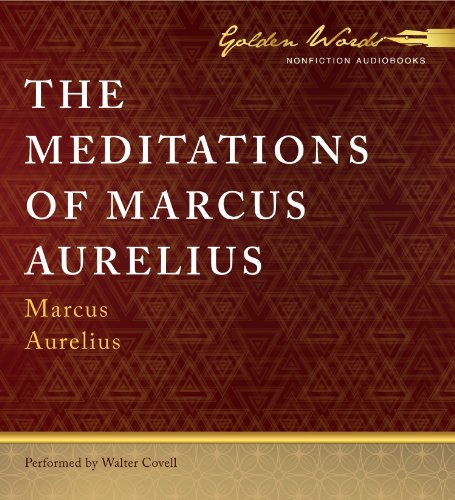
Marcus Aurelius was Roman Emperor from 161 C.E. to his death in 180 C.E. He was destined to be a leader, having been born into a prominent family – one related by blood and marriage to rulers and bankers. During his era, Romans who inherited power and vast fortunes were expected to set an example. Marcus shouldered his responsibilities with a clear sense of honor. He was history’s first ombudsman, and if his role as a legislator or conqueror was not great, he did set high standards for emulation. Written in the form of confessions, his meditations provide a window into his insights on duty, virtue, and humility. He was the last of the “Five Good Emperor,” and is also considered one of the most important stoic philosophers. The Meditations, written on campaign between 170 and 180 C.E., is still revered as a literary monument to a government of service and duty, and it has been praised for its “exquisite accent and its infinite tenderness.” In fact, John Stuart Mill, in his Utility of Religion, compared The Meditations to the “Sermon on the Mount.”

I found his meditations fascinating I love history, philosophy, and religion. This book covered all three subjects and kept my interest. It is not often that you get a philosopher emperor to write down his thoughts, but this is what happened here. You have a man who by all accounts was a great leader and a good man and we get to see what was important to him and what his underlying assumptions were about life.His values are quite universal. For example, he values self-mastery, and doesn’t like complainers. As an engineer, I enjoyed hearing about how he thought things worked. Many are out of date, but several are what we would consider accurate.I got a better feel for Stoicism from his discussions and it helped me understand how the Romans thought prior to adopting Christianity. He did make a disparaging comment about the Christians; he thought they were fanatics that didn’t work well with others. I noticed from history that he was involved in their persecution in Gaul.I highly…
Memoirs of an Amazing Leader When it comes to Stoic philosophy, Marcus Aurelius is second to Epictetus in the discussion of avoiding the indulgence of emotion. However, Aurelius’ “Meditations” is different simply because it’s the first leadership memoir based on Stoic philosophy.The book is raw – it seems that these were never going to be published, so it had a bluntness to it and an honesty rare for a military leader, let alone one of the best Roman Emperors in history. He was a spiritual man, and tried to rationalize his duties. It lacks rhetorical flourish but it’s honest.I don’t know if the book stands alone as a philosophical work, but it is an interesting work about self improvement, duty and service. Despite his reputation as a “philosopher king,” the book remains a valuable book in leadership and history.The Kindle version itself is pretty well laid out with ample enough notes and historical background on Aurelius himself to help you better understand the man himself…
Great book, bad Kindle file (Just to be clear, the Meditations is a five-star book. My two-star rating applies only to this Kindle edition.)Marcus Aurelius, emperor of Rome, may be the closest mankind has ever come to producing the philosopher king that Plato envisioned in The Republic. A reluctant ruler and a reluctant warrior, much of his reign was spent in battle, defending the frontiers of the empire from the “barbarian” hordes. Fortunately for us, he carried a notebook along on his military campaigns, and thus we have the Meditations. Marcus’s writings reveal him to be the last and greatest of the classical Stoics. Stoicism is a school of thought that asserts we have no control over our lives, only control over our perceptions. It advocates that the best life is the life that is lived in accordance with nature (not “nature” as in grass and trees, but “nature” as in the order of the universe). By concentrating one’s thoughts and choices on what is good and virtuous, and disregarding the…